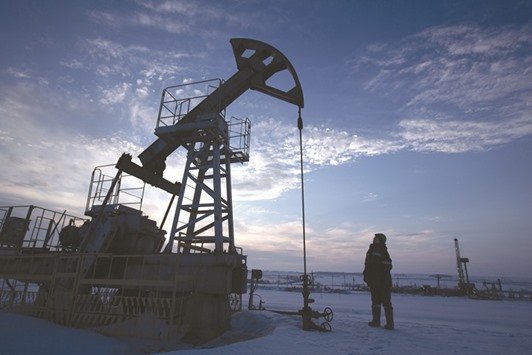Less is more for Russia’s public finances when it comes to a supply deal with Opec to restrain oil output.
Assuming crude stabilises at around $55 a barrel, government revenue is “significantly more sensitive” to oil prices than volumes, which means the budget stands to gain more even if production stays down under the terms of the agreement, according to Citigroup.
Crude’s rebound from its biggest slump in a generation has brought an estimated increase of 7% in taxes last month from November, though gains in the rouble have meant a smaller payoff for Russia by cutting into the local-currency value of its exports.
On Monday, Russia and Saudi Arabia said they would consider prolonging their output cuts for longer than the six-month extension the Organisation of Petroleum Exporting Countries is widely expected to agree to when it meets on May 25.
“The math is indeed supportive of a Russian decision that aims at delivering an extension of the Opec deal,” said Ivan Tchakarov, an economist at Citigroup in Moscow. “The budget is much more sensitive to price than volume.”
The relationship with Opec may not hold next year, encouraging Russia to pull out of the deal toward the end of 2018 as the balance shifts in favour of higher volumes, according to Citigroup.
All members of Opec support an extension of the cuts for a second six-month period, as do other nations that joined last year’s accord, oil ministers of Iraq and Algeria said Thursday in a joint news conference in Baghdad. Crude rose on Thursday after the biggest advance this year as US stockpiles fell more than twice as much as forecast, sparking speculation that Opec’s output cuts are finally taking effect.
Russia’s backing is crucial as oil has given up all its gains since Opec and other producers signed a deal late last year to limit supply for six months from January. Crude in New York continues to trade below $50 a barrel as surging US production weighs on prices. American shale explorers are boosting drilling budgets 10 times faster than the rest of the world and production is returning in Libya.
Still, Russia’s Urals export blend has averaged $51.84 in the first four months of the year, more than 50% higher compared with the same period in 2016, according to the Finance Ministry. The share of oil and gas revenue was at more than a third of budget income in 2016.
While strains on the economy are easing, the Finance Ministry still wants to reduce the budget shortfall by one percentage point each year to balance the books by 2020, similar to plans by Saudi Arabia. This year’s deficit may be about 2% of gross domestic output, compared with an initial plan for 3.2%, Finance Minister Anton Siluanov has said. The shortfall was at 1.4% of GDP in the first quarter.
“Given that the economy has already adjusted to the major shocks caused by the plunge in oil prices and substantial rouble depreciation, Russia would benefit from stable oil prices,” said Piotr Matys, an emerging-market currency strategist at Rabobank in London.
Even as oil’s prospects have improved, the authorities have mostly stuck with a dimmer view. The Bank of Russia sees Urals at an average of $50 a barrel this year, but falling to $40 at end-2017 and then staying near that level in 2018-2019. The level of $40 is also being used to calculate the country’s budget in 2017-2019.
The government’s updated outlook, released last month, sees the average oil price at $45.60 this year, up from $40 in its previous forecast, according to Economy Minister Maxim Oreshkin.
To insulate the economy and the exchange rate from an energy windfall, the Finance Ministry is buying foreign revenue earned in excess of the $40 oil price assumed in the budget and refraining from spending income received when crude exceeds that level.
“Russia views an oil price above $40 as a very pleasant bonus to have,” Tchakarov said. A level “somewhere around or above $50,” combined with the rouble at 60 per dollar, “would deliver the fortuitous mix of above-budgeted rouble price of oil, lower-than-forecast budget deficit and higher oil revenues.”
While oil output has historically been more volatile than prices, that doesn’t mean Russian government revenue is less sensitive to volumes, according to VTB Capital economist Alexander Isakov.
“The rationale behind the deal is that commodity market prices have drifted away from levels consistent with current extraction technologies,” he said. “Thus, rationing of the oil supply is an attempt to bring prices closer to what the members of Opec and associated countries believe to be a more stable equilibrium.”

A worker inspects a pumping jack during oil drilling operations in an oilfield operated by Bashneft in Russia. Assuming crude stabilises at around $55 a barrel, government revenue is u201csignificantly more sensitiveu201d to oil prices than volumes, which means the budget stands to gain more even if production stays down under the terms of the agreement, according to Citigroup.
